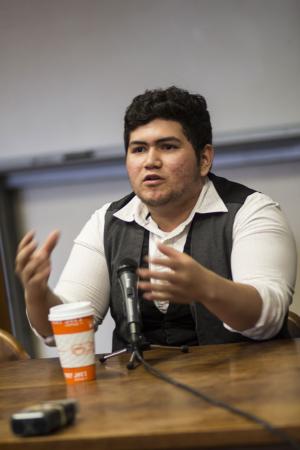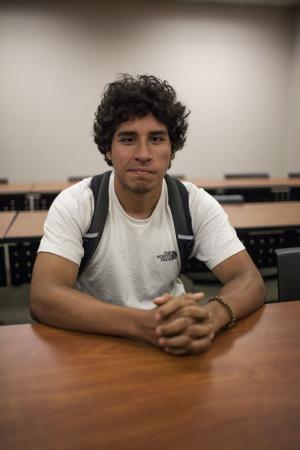Undocumented Students, Banned by the State, Fight to Attend UGA

Photo Credit: Joshua L. Jones
Protestors march through the UGA campus demanding an end to the Board of Regents' policy prohibiting undocumented students at UGA.
New student orientation at the University of Georgia has an extra step that students at the University of Texas, University of Arizona and University of Southern California, as well as most of the of the other top research universities in the country, don’t have to confront.
The extra step is a “papers, please” table in front of the door to the Tate Center Grand Hall, where orientation will be held and all the new students will be told how happy UGA is that they chose to become Bulldogs. But most students don’t know that they are required to show a sharply dressed UGA representative their papers because of a 2011 ban on undocumented students.
Under the University System Board of Regents' policy 4.1.6, students who are not lawfully in the United States are barred from enrolling in competitive admission schools—UGA, Georgia Tech and Georgia State in Atlanta, Georgia College and State University in Milledgeville and Georgia Regents University in Augusta. Even valedictorians are banned.
“I was recruited in my senior year, because I was an outstanding student, to come to the University of Georgia and spend an entire week meeting professors," says Eduardo Samaniego. "I sat down in classrooms with a lot of other kids coming from other states, and then a few months later, when I go to my school counselor’s office and tell her I’m ready to apply to the University of Georgia, we go through all the basic stuff, then we came to that point where you need to have a Social Security number to apply to the University of Georgia. At that point, I didn’t know what to do, and she said, ‘I didn’t know you were an illegal immigrant,’ and I told her, ‘What is that?’ What does that mean?’ That’s when I realized what it meant to be undocumented, that I couldn’t pursue my dream like any other of my classmates.
"I was the student body president at one of the largest high schools in Cobb County [North Cobb High School]. I was one of the first ones at school every day and one of the last ones to leave, and I graduated with honors, but everything was gone when I walked into my counselor's office that day. I had decided that UGA was my dream college; I wanted to be there; I wanted to have an education, and Policy 4.1.6 said no.”

Photo Credit: Joshua L. Jones
Eduardo Samaniego [center] at an Apr. 28 rally outside the UGA Administration building.
Freedom U
Samaniego now attends Freedom University, a program started by UGA and Emory University faculty in response to 4.1.6 that offers college-level classes to undocumented students for free.
“Growing up, college was such an abstract idea, because I didn’t know anyone that had gone to college, because I’m a first-generation immigrant, and growing up no one in my family went to college," says Alejandro Galeana Salinas, who graduated from Cedar Shoals High School in May. "There were always the pep talks at school—‘You’ve got to go to college to have a better future’—and this, to me, growing up undocumented in Georgia, when I heard these talks about, ‘You’ve got to go to college’ back then, I didn’t think that applied to me, because only a few years ago the word for us was 'illegal,' and we would call ourselves that, and I was used to seeing my parents just work in the factories. My parents work, work, work just to make ends meet, and that was normal. No one I know had a career—it was just work.
"Then I started to go to Freedom U classes, and that changed all of this for me," Salinas says. "The classes weren’t like the standardized high school classes I was use to, where they try and squeeze in so much material into a single semester… Freedom U was very student-driven, and you had to really think critically.
"Then there was our first rally back in 2011; that was where my activism started. I can’t believe how much I’ve changed over the last two years because of Freedom University. At first, my activism was very broad and very emotion-driven with all of these laws coming out. I remember talking with my parents about possibly going back to Mexico after HB 87 became law.”
House Bill 87 is the Georgia version of the Arizona anti-immigration law that drew national outcry.
“It meant if you can't provide documents, you will get deported immediately, and if you get caught even riding in a car with a U.S. citizen, they get in trouble in addition to you getting deported," Salinas says. “The law is just so mean-spirited and hurtful. Now, you can’t even have a person who is undocumented in your car, and everyone in the car gets in trouble if one of the passengers is undocumented. It's crazy, and it's ridiculous that it's happening here in Georgia. Me and my family were scared, we were scared and fearful."

Photo Credit: Joshua L. Jones
Alejandro Galeana Salinas speaks in UGA’s Miller Learning Center at a panel discussion on undocumented students.
Salinas compares Dreamers—the nickname for those who support the DREAM Act, a federal bill providing a path to citizenship—to the civil rights activists of the 1960s. "There have always been groups that have been marginalized and fought against," he says. "There were a lot of people that opposed the Civil Rights Act and are still racist towards African Americans today. It's absolutely ridiculous. We learn from history that we don’t learn from history… If you're not even going to try and be empathetic, you also have to look at the facts and don’t buy into the rhetoric that is used—that we are lawbreakers, that we don’t pay taxes. We do pay taxes.”
Such rhetoric bothers Salinas. “I read a comment on one of the stories about a past demonstration, and it said, ‘These kids are just trying to use our Georgia taxpayer dollars again,’ and I just think that’s ridiculous," he says. "Some of those taxpayer dollars are mine and my parents,’ and some of the taxpayer dollars are from the 11 million undocumented people living in the U.S. You have to look at the facts. We are not the enemy here. We are not a bunch of lawbreakers. We are also not perfect, but we have to find a common ground and look at what this ban represents.
"This ban is not about the few dreamers who want to get access to a great education. The reason that this ban is happening is because there’s a bigger problem of America forgetting its past. The United States would not be the country it is today without immigration. And people want to argue, ‘Why don’t you do it the legal way?’ Well, if you look at history, when it comes to Native Americans, that argument falls flat. And then Ellis Island, where if you had good health and paid a small fee you, could immigrate to the U.S. There is not a simple answer for immigration in the U.S.”
Struggling to Pay
Maybe that's why the U.S.—especially Georgia—has such a complicated system. In June 2012, President Barack Obama announced that undocumented young people who came to the U.S. as children could apply for Deferred Action for Childhood Arrivals (DACA). Once accepted into DACA, an undocumented youth gains relief from deportation and the opportunity to apply for a work permit, which includes a Social Security number to use for work, taxes and college applications.
Still, undocumented students can’t attend the top five research universities in the state under the regents' ban, and they have to pay out-of-state tuition to attend any of the other colleges in Georgia. To be eligible for in-state tuition, a legal U.S. resident needs to have lived in Georgia for only one year, “and most of the people I know have been here well over a decade,” Salinas says.
”Not only does this spit in our faces but also gets rid of potential for the state," he says. "They’re shooting themselves in the leg by having this ban, because there’s a lot of deserving people that have the grades for it, and that have the minds for it, and these student being able to attend college with in-state tuition would benefit everyone. But because of the policies in place in Georgia, students that have lived most of their lives in the state are having to go to other colleges and having to pay more money.”
Salinas applied to two colleges and got accepted into Oglethorpe University in Atlanta, a private school. "The town is amazing; it looked fantastic, but I can't afford it, and I have no type of government assistance, so that’s out of the question, because the tuition is $28,000 a year,” Salinas says, “If I didn’t learn all the things I’ve learned in the last three years, and I was just continuing the cycle of working, working, working, for $28,000 I could have my own little trailer, a nice little Honda Civic and keep on living a comfortable life, but that $28,000 is what it costs just for a year of college. This really shows you how this ban and how this broken system is doing exactly what its intended to do."
Israel Casas, a sophomore engineering major at the University of North Georgia, found himself in a similar situation. He was born in Mexico but has lived in the U.S. since he was a baby. Nevertheless, when it came time to choose a college, he was forced to pay more than three times what a native-born Georgia resident would pay because of his immigration status.
“My dad came to the U.S. when he was 18 years old to work and send money back to my mom, and he would travel back and forth to see his family and my mom. When they were in their early 20s, they decided to make a new life over here, but my mom was pregnant with me, and they wanted to take my mom over while she was pregnant, but they decided it was unsafe, and they were just going to have me in Mexico. That really changed everything for me. I could’ve been a U.S. citizen. I got here when I was one year old.
“My dad already had a job, and I started pre-K. Then we moved to Bogart, GA, where I started at Cleveland Road Elementary School. As soon as I got into kindergarten, I started to learn English, because my parents didn’t know English at all, and I guess I was learning English at the same time as my dad. The school had ESOL [English for Speakers of other Languages] classes to help kids that were struggling with English. I [learned] English around second grade, and I got out of ESOL classes, and I got along with everyone. I went to Clark Central… and around my junior year, I heard about the ban on undocumented students from my dad. He thought it was a missed opportunity, saying, ‘If only we had brought you here to be born, we would’ve been unaffected by the ban,' and to be honest, my work permit wouldn’t say 'no re-entry,' either, because that also affects me.“
Casas hoped the DACA program would help him attend college. “I applied to the University of North Georgia," he says. "When I was applying, I filled out everything, and the only thing I was skeptical of was the Social Security box, and to be honest, I didn’t even think UNG would accept me, so I just left that box blank, and I sent in my application, and the next thing I know, I got an acceptance letter. I was happy but confused. I didn’t know that they would accept me, and after the whole process, all I could think was, 'Yes I’m going to get an education.'”
Then the reality set in that Casas would have to pay out-of-state tuition in a state where he’s lived his whole life. That meant an $8,778 bill for two semesters of classes, rather than $2,487.

Photo Credit: Joshua L. Jones
Israel Casas has lived in Georgia for 20 years but still must pay out-of-state tuition at North Georgia University.
It’s hard to come up with that tuition money, Casas says. “I’m really proud of my dad—he worked his way up to starting his own company, and he’s been paying for my school through this, and I go out and work summers with him. And every time I go out and work with him, I feel like I can’t even last through the summer, and he’s been doing this his whole life. It’s a whole different world where he works in Newnan, Georgia, which is a two-hour drive… Newnan is a whole different world, because Athens is so diverse, and Newnan is not. The majority of the people he works with are white, and they really do look down upon him, and it's tough to see.”
Casas' younger bother was born at St. Mary’s Hospital in Athens and is an American citizen, as is his nine-year-old sister. His siblings have gone to the same schools he did and will be able to attend UGA or any of the top five research universities in the state, unlike Israel, because of the simple fact that he was born a few hundred miles away.
Salinas' immigration status is similar. "I’ve been here since the age of two years old, and I’ve lived in Athens ever since," he says. "The reason for that was economic, because there was no more work or opportunity for my parents to find work.
"I think most people that migrate the way that we did, as strange as this mentality may seem, most people come to the States with the mentality of, ‘Oh, I’m only going to be here for a few years, then I’m going to go back.’ But for many, many people, that just doesn’t happen, because of routine. You start assimilating and putting roots down and, next thing you know, I’ve been here for almost 16 years.
"I have a mixed-status family. My sister is a U.S. citizen, and I have nephews and nieces that are U.S. citizens, and I just have DACA. You don’t think this is going to happen when you come to the U.S., but next thing you know, it happened.”
A Way Out
There is a potential solution for people like Casas and Salinas: Under DACA, undocumented youth are legally present in the U.S., and being in the U.S. legally is what the Board of Regents requires. Thirty-nine undocumented young people from across Georgia, including Salinas, have filed a lawsuit arguing that the University System is not following its own tuition policy. (A judge dismissed the lawsuit in June, but attorney Charles Kuck is appealing.)
“The day I decided to become a plaintiff in the lawsuit against the Board of Regents was after a Freedom U class. I was approached by another of the plaintiffs in the case to become one of the plaintiffs," Salinas says. "I said ‘yes,’ because I know it was right, but… now it's finally starting to sink in that this is happening, and there’s a reason for everything we’ve done over the past three years. Establishing Freedom U and now [that] it's snowballing, I can feel it that we are getting somewhere, somewhere very powerful, and it's no coincidence that this is happening. The lawsuit against the Board of Regents is the result of all the work of GUYA [Georgia Undocumented Youth Alliance] and Freedom U and other organizations.”
Undocumented students and sympathizers are putting pressure on university officials in other ways, such as through an Apr. 28 march from the Arch to UGA President Jere Morehead's office that drew several hundred people and led to a confrontation between protestors and police.
“The ban on undocumented students doesn’t make any real sense to me, except if you’re just being cruel," says William Stith, who graduated from UGA with an MBA last spring. "Why wouldn’t you want to educate immigrants? I just don’t understand where it comes from; it makes no logical sense to me. You’re also hurting the economy; you’re just wasting potential. These people coming out of high schools could be productive members of society. Like I said, the only logical explanation for this is cruelty or something racial."
Eric Uhls, another MBA and law-school graduate, says he'd support a policy similar to Texas or Arizona's, where a student who graduates from an in-state high school can attend any university in the state. "You're punishing people for something they didn’t have any control over,” Uhls says. “I think it would be a good idea, because it wouldn’t be punishing people that had no choice in the matter in coming here; so at this point, what are their options? They’re punishing them to score political points.”
Protestors called on Morehead to repudiate Policy 4.1.6. “I think the lawsuit is very important, but I think what is more important is how these student have mobilized their communities and the activism that they’re doing there today," UGA and Freedom U professor Pamela Voekel said during the rally. "We are not stopping; this fight is ongoing, and the pressure will keep building. UGA doesn’t know this, but this was a huge defeat for UGA, a moral defeat."
Morehead refused to address the crowd of demonstrators but issued a press release after meeting with Samaniego and others from Freedom U: “The University community appreciates the variety of perspectives shared through dialogue on a college campus. That is why I had a meeting with representatives of the Undocumented Student Alliance at UGA today. As a unit of the University System of Georgia, we follow Regents policies. As President, I listened to the concerns expressed today and will convey those concerns to the Regents.”
Although the administration didn't meet their demands, demonstrators declared victory. “I think they gave the administration a vision in dignity—the dignity to come out and fight against this ban and for their right to attend the University of Georgia, and I think the university covered itself in shame," Voekel says. "I think Jere Morehead should have come out and addressed the students and say his views to the crowd, that he opposes the ban on moral grounds… The students came out here hoping he would do the right thing, and he did not do the right thing. And I think the message that they bring here today is that 50 years after the integration of the University of Georgia, we are still a segregated university. There are still people who are being singled out; make no mistake about that. This is about race; this is about keeping people in particular economic conditions, making sure that they’re cutting grass and not attending the University of Georgia. I think we should all be outraged.”











comments